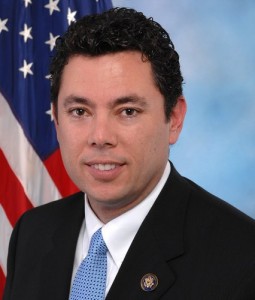Constitution
Cut cap balance act vote set

A vote on HR 2560, the Cut Cap Balance Act of 2011, the most comprehensive plan to rein in the national debt, will take place tomorrow. But Barack H. Obama has already threatened a veto.
Details of the Cut Cap Balance Plan

Representative Jason Chaffetz (R-UT-6), author of the Cut Cap Balance Act of 2011. Photo: United States House of Representatives
Representative Jason Chaffetz (R-UT-3) introduced HR 2560 last Friday. The clerk of the House referred it to the House Committees on the Budget and Ways and Means. At eleven pages, it is one of the briefest bills in Congress.
The “cut” part of Cut Cap Balance limits discretionary spending for fiscal year 2012 to $1,019,402,000,000 in new budget authority and $1,224,568,000,000 in outlays. This includes not more than $126,544,000,000 in spending on the “global war on terrorism.” Social Security, Medicare, veterans’ benefits, and interest payments would be exempt from spending limits.
The “cap” part brings the total budget down to 19.9 percent of gross domestic product by 2021. (Budget bills typically run for no longer than ten years.)
The “balance” part raises the debt ceiling by about $2.4 trillion, but only after Congress proposes a balanced-budget amendment to the Constitution.
Details of a balanced-budget amendment
Three forms of that amendment would be acceptable:
- H J Res 1, as reported out on June 23, 2011.
- S J Res 10, as introduced on March 31, 2011.
- H J Res 56, as introduced on April 7, 2011.
Each one would:
- Force Congress to pass a balanced budget, unless three-fifths of both houses agree to an exception.
- Force Congress to limit spending to 18 percent of GDP, unless two-thirds of both houses agree to an exception.
- Set a ceiling on the debt held by the public that could not rise unless three-fifths of both houses agree to raise it.
- Force the President to submit a balanced budget before the fiscal year.
- Forbid any tax increases unless two-thirds of both houses agree to raise taxes.
The only way to set these provisions aside would be to declare war, or at least to declare that US troops are in military conflict that poses an “imminent and serious military threat.”
Political problems with Cut Cap Balance
The House is very likely to pass the Cut Cap Balance bill. The Senate is almost as likely to defeat it. Even if the Senate passes it, Obama has already threatened to veto it. Still, other plans that Congress is considering do not have much better chance of passing.
Practical problems with Cut Cap Balance
The most practical problem with the Cut Cap Balance plan is with the “Balance” part. Congress could waive the balanced-budget amendment in time of war. But at least some versions of the amendment force Congress to declare specifically the military conditions for suspending the budget rules.
Congress already has the power to declare war. (See Article I, Section 8, Clause 11 of the Constitution.) No one has said in what form Congress must declare war. The two latest versions of the balanced-budget amendment say that Congress must declare war against a nation-state to suspend the budget rules. (Thus declaring war against non-governmental groups and the friends, relatives and associates of members would not do.)
The proposed Constitutional amendment would also allow Congress to certify that US troops are fighting in a conflict that presents a clear danger to the country. Again, the two latest versions allow such a resolution with a three-fifths vote of both houses. Furthermore, a resolution to suspend the budget rules must say specifically how much money the country will spend on such a conflict.
But some conservatives and libertarians might take alarm with the first version of the balanced-budget amendment. It sets no limits on the form for declaring war. Furthermore, it allows Congress to vote by simple majorities that US troops are engaged in a national-security-threatening conflict.
Where does Cut Cap Balance stand?
Tea Party activists throughout the country want the Cut Cap Balance act to pass. They might not know about the three different forms of the balanced-budget amendment. In any case, amending the Constitution requires two-thirds of both houses. The current House might not have two-thirds to agree on any of these versions. The Senate would not agree.
The Cut Cap Balance Act itself has only minor problems. The three different balanced-budget amendments have the bigger problems. The Tea Party movement, and certain other movements that call themselves “patriotic,” must settle the question of whether, how, and why a free society declares and makes war.
Featured image: a Weimar-era householder wheels a barrow full of worthless Reichsbanknotes to the corner baker to buy a loaf of bread.
[amazon_carousel widget_type=”ASINList” width=”500″ height=”250″ title=”” market_place=”US” shuffle_products=”True” show_border=”False” asin=”0446510998, 0470047666, 0385512244, 0470612533, 1449555381, 1586489941, 1451542291, 047047453X, 1460954262, 193317496X” /]
Terry A. Hurlbut has been a student of politics, philosophy, and science for more than 35 years. He is a graduate of Yale College and has served as a physician-level laboratory administrator in a 250-bed community hospital. He also is a serious student of the Bible, is conversant in its two primary original languages, and has followed the creation-science movement closely since 1993.
-

 Executive4 days ago
Executive4 days agoSecret Service chief gets no solace
-

 Civilization5 days ago
Civilization5 days agoBiden drops out of race
-

 Executive2 days ago
Executive2 days agoWaste of the Day: Louisville Taxpayers Pay Nearly $600,000 For Empty Building’s Maintenance, Security
-

 Guest Columns4 days ago
Guest Columns4 days agoFear Itself: Democrats’ Favorite Strategy Caused Their Current Chaos
-

 Executive3 days ago
Executive3 days agoWhere is Joe Biden – or Jill?
-

 Executive1 day ago
Executive1 day agoWaste of the Day: Throwback Thursday: Cities Used Crime Prevention Funds on Soccer Games, Paper Shredding
-

 Civilization4 days ago
Civilization4 days agoBuild Iron Dome in the United States To Prepare for Israel’s Worst Day
-

 Executive2 days ago
Executive2 days agoFacile and politically motivated suggestions















This bill has some good intentions, but is basically political theater. Congress can’t even negotiate like adults to work out a straightforward debt-ceiling deal, and we’re losing half the summer posturing over this when so many other issues need attention, like creating jobs.
Try and picture how quickly the U.S. will be able to respond to rapidly-changing threat scenarios around the work if our ability to respond depends on people being able to agree to how serious certain threats are.
Notice that many of the conservative leaders in both the Senate and the House were incumbents when Bush destroyed a balanced budget, and then cut taxes while initiating two wars while keeping the cost for those wars “off the books” for budget purposes. This wouldn’t have happened without their support, so they are culpable.
This bill is tantamount to saying, “We, the people who got us into this mess due to a lack of good judgment and restraint, want to force ourselves by law to have to use good judgment and restraint, but we reserve the right to move some of the goalposts that determine good judgment and restraint”.
Are intelligent people expected to think that this is responsible leadership? It’s political theater, and would hurt the ability to run the country nimbly in a changing world.
When I was a manager, I’d never consider hiring or retaining anyone who required themselves to be bound to a contract “to perform well” in order to perform well. As voters we have the ability to fire most of these people in in just over a year, and all of them by 2016.
They are passing on an historic opportunity to change the fiscal discipline in D.C., with $4 in spending cuts for every $1 of additional revenue, and this is what they consider better thinking?
We don’t need that type of “better” thinking – we need to vote in better people who actually can think.
You know, having an amendment that demands a balanced budget is, in some ways, a good thing, but even a cursory knowledge of the history of the American economy will show that deficit spending isn’t the devil, and in fact, that’s what allowed for the recovery from the Great Depression.
Instead, I would like to see a reasonable tax on the richest 1%. This is the easiest way to fix both the deficit and would do wonders to stimulate the economy. Of course, knowing this site, I will now be accused of hating the successful, because really, why should the insanely wealthy pitch in their fair share? I would be more justified in claiming that people who will take this tact hate the middle class.
Here’s a neat article that explains what’s really wrong with the economy, why we have a huge deficit and what will happen when we fail to fix it and it’s written by a Nobel prize winning economist, so he might just know what he’s talking about. Read it here.
Seriously dude? I wouldn’t be able to afford fuel for my private jet more than 25…to 30 trips a year. A tax on me would screw me over!!!
We should tax you instead.
Whom are you replying to? This sounds like sarcasm. Trouble is, “Don’t tax you, don’t tax me, tax that fellow behind the tree” seems to be the typical attitude.
The tax rates in effect just before the Bush tax cuts coincided with economic growth, jobs growth, and a budget surplus. The Bush cuts did not improve employment, the economy or the deficit in any realistic sense. Reverting them now for those earning over $250K per year isn’t wrong – its a return to common sense, and to rates that would still be lower than they were for most of the last century.
[…] Cut cap balance vote set […]
The big problem is that this bill (the “cut” part) sets some numerical goals without specifying at all what will be cut, other than by large category. The Republicans don’t want to give that detail because the American people will throw up all over it when they see what the impact will be. More irresponsibility.
Flat Rate tax, problem solved. Everyone pays the same percentage rate then no one can complain there paying more then the others.